Letters to the Editor: California's green energy initiatives could face same problems as high-speed rail

To the editor: In spite of its high priority as the largest infrastructure project in the U.S., the bullet train is reporting additional delays and cost increases. Perhaps the biggest reason for delays and cost increases is land acquisition. Needed parcels along the route are not available, seven years after construction contracts were issued.
Similar failures could occur with the state’s efforts to reach net zero, no net greenhouse gas emissions, by 2050. A lot of land is required for transmission lines, for solar and wind farms and other purposes. If the state and private developers have to acquire land on a parcel-by-parcel basis, dealing with environmental and legal issues and price negotiations, then the state’s clean energy goals will not be achieved.
William Fletcher and Craig Smith, Newport Beach
The writers are the coauthors of "Reaching Net Zero: What it Takes to Solve the Global Climate Crisis."
::
To the editor: California's rail authority has just admitted that the short train route between Merced and Bakersfield will cost $22 billion.
This is so absurd it raises this question: Wouldn't it be wiser to kill the project, lease a few helicopters and shuttle passengers needing to make that trip each day? $22 billion would pay for quite a few flights!
James Regan, Carlsbad
::
To the editor: More delays and missed deadlines. More money pouring down an abyss of mismanagement. Yet more reasons to put an end to California's own "Bridge to Nowhere."
Though I have often dreamt of the day that I could ride from Bakersfield to Merced at 200 miles per hour, I think that the best use of high-speed rail would be from L.A. to Vegas, with a stop in Riverside. It would be packed and would pay itself off in a matter of years.
Kent Grigsby, Riverside
This story originally appeared in Los Angeles Times.
